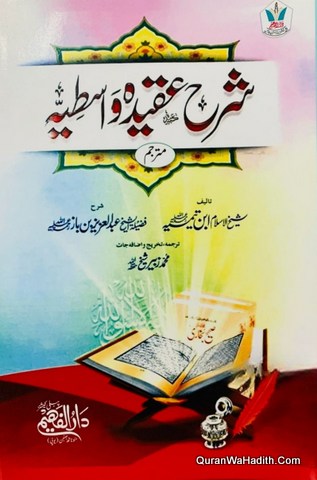-

-

-

-

-

-

-

-

-

1125-1225 AH: Qazi Sanaullah Panipati
Qazi Muhammad Sanaullah Usmani Panipati Mujaddidi Died d. 1225 AH. Era Medieval era School Sunni, Hanafi, Naqshbandi Main InterestsTafsir and Naqshbandi Silsilah Notable ideasTakfir of Yazid I, Love of Sahaba and Ahle Bait alike, Takfir of Shiaism He belonged to the Mujaddidi order of Sufism, which is the main branch of Naqshbandi Sufi tariqah. His spiritual lineage goes to Muhammad, through Shaikh Ahmad Sirhindi, the Mujaddid of eleventh Hijri century. The complete lineage is as under:
- Muhammad ﷺ d.11AH, buried Madinah SA (570/571–632 CE)
- Abu Bakr Siddiq, d.13AH, buried Madinah, SA
- Salman al-Farsi, d.35AH buried Madaa’in, Iraq
- Qasim ibn Muhammad ibn Abu Bakr d.107AH buried Madinah SA.
- Jafar Sadiq, (after which moves to Iran) d 148AH buried Madinah SA.
- Bayazid Bastami, d 261AH buried Bistaam, Iraq (804–874 CE).
- Abul Hassan Kharqani, d 425AH buried Kharqaan, Iran.
- Abul Qasim Gurgani, d.450AH buried Gurgan, Iran.
- Abu Ali Farmadi, (after which moves to Turkmenistan) d 477AH buried Tous, Khorasan, Iran.
- Yusuf Hamadani, d 535AH buried Maru, Khorosan, Iran.
- Abdul Khaliq Ghujdawani, d 575AH buried Ghajdawan, Bukhara, Uzbekistan.
- Arif Reogari, d 616AH buried Reogar, Bukhara, Uzbekistan.
- Mahmood Anjir-Faghnawi, d 715AH buried Waabakni, Mawralnahar.
- Azizan Ali Ramitani, d 715AH buried Khwaarizm, Bukhara, Uzbekistan.
- Muhammad Baba Samasi, d 755AH buried Samaas, Bukhara, Uzbekistan.
- Amir Kulal, d 772AH buried Saukhaar, Bukhara, Uzbekistan.
- Muhammad Baha’uddin Naqshband, d 791AH buried Qasr-e-Aarifan, Bukhara, Uzbekistan (1318–1389 CE).
- Ala’uddin Attar Bukhari, buried Jafaaniyan, Mawranahar, Uzbekistan.
- Yaqub Charkhi, d 851AH buried Charkh, Bukhara, Uzbekistan.
- Ubaidullah Ahrar, d 895AH buried Samarkand, Uzbekistan.
- Muhammad Zahid Wakhshi, d 936AH buried Wakhsh, Malk Hasaar
- Durwesh Muhammad, d 970AH buried Samarkand, Uzbekistan.
- Muhammad Amkanaki, (after which moves to India) d 1008AH buried Akang, Bukhara, Uzbekistan.
- Muhammad Baqi Billah Berang, d 1012AH buried Delhi, India.
- Ahmad Faruqi Sirhindi, d 1034AH buried Sarhand, India (1564–1624 CE)
- Muhammad Masum Sirhindi, d 1079AH buried Sarhand, India.
- Muhammad Saifuddin Faruqi Mujaddidi, d 1096AH buried Sarhand, India
- Muhammad Mohsin,
- Nur Muhammad Badayuni, d.1135AH
- Mirza Mazhar Jan-e-Janaan, d.1195AH
- Qadi Thanaullah Panipatti
-
-13%

1152 Naqoosh e Murabbiyat | 141 Vol | ١١٥٢ نقوش مربعات
Original price was: ₹18,425.00.₹16,000.00Current price is: ₹16,000.00.Amount For This Single Vol only. For Complete Set Please Contact Us
-

-

-

-

-

-

1280-1362 AH: Maulana Ashraf Ali Thanvi
Born 19 August 1863 Died 4 July 1943 (aged 79) Resting place Thana Bhawan Nationality Indian (British subject) Ethnicity Indian Era Modern era Region Islam Occupation Islamic scholar Jurisprudence Sunni islam Movement Deobandi Alma mater Darul Uloom Deoband Disciple of Haji Imdadullah Ashraf ‘Ali Thanwi (August 19, 1863 – July 4, 1943) (Urdu: اشرف علی تھانوی) was a prominent Indian scholar of the Deobandi school. Ashraf Ali was from the first wedlock of Abdul Haq Sahib. From his first wife, Maulvi Abdul Haq had four sons. The eldest one was Ashraf Ali Thanvi himself, followed by Akber Ali Sahib Thanvi and Akhtar Ali. Thus Thanvi had seven immediate siblings and four step siblings. Ashraf Ali Thanvi himself wed twice. From the first wife he had no children. However, he took his nephew Shabbir Ali Sahib Thanvi from his brother and took responsibility of his upbringing. Thanvi married second time with a widow who brought with herself a daughter. Hence Thanvi had no biological son or real daughter of his own.
Thanwi graduated from the Darul Uloom Deoband in 1884. It is claimed by Rashid Ahmad Gangohi, one of the founders of the institution, arrived for the graduation ceremony, Maulana Mehmud Hasan informed him that Thanwi, an especially intelligent student was about to graduate. Gangohi wanted to test this student by asking the most difficult questions that he could think of. Thanwi’s answers reportedly amazed and pleased Gangohi, who himself conducted the Dastārbandī Jalsa, the turban-tying ceremony marking graduation.
After his graduation, Thanwi taught religious sciences in Kanpur for fourteen years. Over a short period of time, he acquired a reputable position as a religious scholar, of Sufism among other subjects. His teaching attracted numerous students and his research and publications became well known in Islamic institutions. During these years, he traveled to various cities and villages, delivering lectures in the hope of reforming people. Printed versions of his lectures and discourses would usually become available shortly after these tours. Until then, few Islamic scholars had had their lectures printed and widely circulated in their own lifetimes. The desire to reform the masses intensified in him during his stay at Kanpur. Eventually, Thanwi retired from teaching and devoted himself to reestablishing the spiritual centre (khānqāh) of his shaikh in Thāna Bhāwan. Upon this transition, Imdadullah remarked, “It is good that you have arrived in Thāna Bhāwan. It is hoped that people will benefit from you spiritually and physically. You should engage yourself in revitalizing our madrasah and khānqāh once more in Thāna Bhāwan. As for myself, I am always praying for you and attentive towards you.
-

-

-

-







